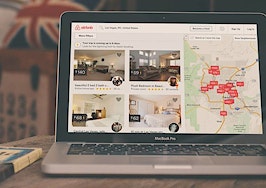- Airbnb is increasingly surfacing in conversations between agents and consumers, and agents can cast a listing's potential rent on Airbnb as one of its perks.
- A recent report on short-term rental hosting sheds light on hosts' motivations, concerns and income, among other things.
- Agents should consider familiarizing themselves with local rules governing short-term rentals, as they may represent the biggest risk of short-term rental hosting.
Short-term rental juggernaut Airbnb is increasingly popping up in conversations between real estate agents and their clients.
How much would a for-sale listing rent for on Airbnb? Does a neighborhood have a lot of short-term rentals, and the constant flow of tourists that come with them? Might a seller let a buyer take a home for a test drive by renting the place for a few nights? (This startup thinks so.)
Some useful information that real estate agents can bring to these discussions was laid out in a report released by Everbooked, a service that helps Airbnb users price their rental listings.
Read on for insight that could help you incorporate Airbnb into your sales strategy and connect with the growing pool of prospective buyers who care about a home’s short-term rental potential.
Hosts’ fears of damage or theft diminishes with short-term rental experience
One thing agents should keep in mind is that prospective short-term rental hosts appear to overestimate the risk that guests will rob or damage units rented through the platform.
More than 6 out of 10 prospective hosts who responded to a survey administered by Everbooked cited theft or damage as a concern.
But active hosts — people who have gotten some actual experience renting through the site — are much less likely to be worried about those risks, with less than 2 out of 10 citing them as a concern.
A listing agent who touts a for-sale listing’s potential to rent on Airbnb could point to those findings to bolster a case to risk-adverse buyers that they really could milk the property for extra cash using Airbnb.
“It appears that once you host, you realize that operating your rental is more of a headache than the fear of someone stealing or damaging your property,” the report said.
[Tweet “These insights on Airbnb could help you incorporate the site into your sales strategy”]
When hosts were asked what they felt was the biggest headache of listing a short-term rental, not getting enough bookings, cleaning and housekeeping, and city regulation/fines topped the list.

Source: Everbooked
Threat of regulation
That last challenge is one that can land hosts in hot water.
Some cities require hosts to obtain licenses to list short-term rentals, while others prohibit them outright. Local governments and homeowner associations may place additional restrictions on short-term rentals as well. And hosts must keep in mind that they are often required to pay federal and local taxes on rental revenue generated by short-term rentals.
Speaking to these legal tripwires, regulation and fines were cited most often by surveyed hosts as a moderate or big risk of renting units through Airbnb.
The longer a host has been using Airbnb, the more likely they are to be concerned with regulation and fines, according to the report. And surveyed hosts were much more likely to cite regulation as the biggest challenge to Airbnb than any other.
A number of real estate agents who contributed to a Facebook discussion on Airbnb’s role in real estate also called attention to the legal hazards that can come with listing short-term rentals.
Some say they are often seeing buyers weigh a property’s potential to rent on Airbnb when evaluating properties.
If short-term rental hosting is viable in their market, informed agents could fill buyers in on the optimal short-term rental pricing for a listing along with the level of demand that the listing would likely receive.
But agents might also want to point those buyers to local regulations or community rules, given their potential to restrict hosting.

Sourced: Everbooked
What motivates hosts?
So how much are hosts leaning on Airbnb for income, and what are they raking in?
Most Airbnb hosts (6 out of 10) join the rental platform to generate supplemental income, but a notable share view the site as a more substantial source of cash, according to the report.
Thirty-two percent of respondents said they signed up for Airbnb to tap the platform for their main source of income or to build wealth.
That means there are quite a few buyers who care deeply about a home’s ability to rent on a short-term basis. So agents may be well-advised to tune into how the site serves their market, and to figure out how much money listings could rent for.
‘Elite minority’ rolling in dough
The report put the median short-term rental income generated on an annual basis by active Airbnb hosts at $3,600.
But get this: the average income earned by hosts was $14,200.
Why the chasmic discrepancy? Because a tiny pool of hosts — many of whom, like hotels, have turned renting out homes into a full-time business — earn vastly higher amounts of income from short-term rentals.
“A small minority of listings were able to command very high rental revenues and an elite minority of hosts make extraordinarily high rental revenues from hosting,” the report said. “1 in every 3,850 US hosts earn $1MM+ in gross rental income.”
‘Rental arbitrage’
How often are short-term rental hosts homeowners? And how often are they the bolder (given the preferences of many landlords), more enterprising sort: renters subleasing units?
Nearly 6 out of 10 Airbnb hosts own all the units they rent, according to the report. The rest either don’t own any of the properties they rent out on Airbnb, or they own some and rent others.
Hosts with multiple listings are much more likely to be engaging in “rental arbitrage,” renting out units at a higher daily rental rate than the effective daily rental rate that they pay, the report found. Only 44 percent of such hosts own all the properties they list on Airbnb.
Hosts with one listing, meanwhile, were much more likely to own the homes they rented. Three-quarters of those hosts own the properties that they list on the platform.
One takeaway: Agents trawling Airbnb for prospective sellers may want to first target hosts with only one listing. They’re much more likely to be capable of selling the properties they’ve listed.
Annual revenue per listing by metro area
Airbnb hosts are raking in much more annual revenue per listing in some metro areas than in others, with Honolulu County, Hawaii; New Orleans-Metairie-Kenner, Louisiana and San Francisco-Oakland-Fremont, California leading the pack, the report found.

Source: Everbooked
Chew over some of the factoids outlined above. You may be able to bring them to bear if you choose to pitch a home’s short-term rental potential as one of its perks to prospective buyers.
Lexington, Kentucky-based agent Jesse McGreevy says bringing up Airbnb recently helped him clinch a sale.
McGreevy learned a buyer looking at one of his listings would be interested in renting out the home if he bought it, but only for a few days at time. That meant the property management arm of McGreevy’s brokerage wouldn’t be able to manage the property on the buyer’s behalf: it only services rentals that have lease lengths of 30 days or more.
The buyer did, however, have a friend who could handle that work. So McGreevy gave the buyer the lowdown on Airbnb. The buyer could use the site to rent out his home for as short of a time as he liked, McGreevy explained.
The buyer “Loved the idea and pressed forward after,” McGreevy said. “He wanted shorter rental times so he could use the unit himself sometimes.”





